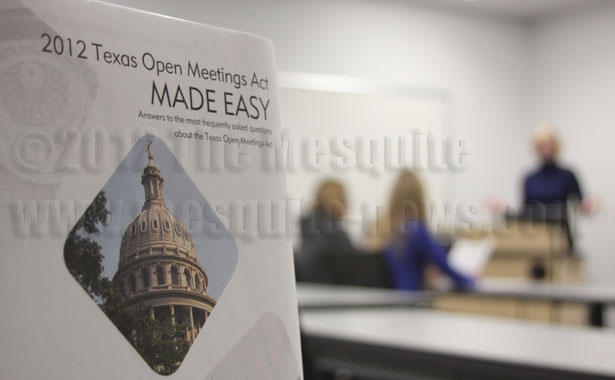
By Grace Newton
In a commentary last month, The Mesquite explored whether administrative meetings on this campus are open or closed and whether the Texas Open Meetings Act applies to those meetings.
The act, passed by the Texas Legislature in 1967, requires governing bodies to conduct open meetings, except for expressly authorized closed sessions, according to the Open Meetings Handbook.
We presented different interpretations of the act and asked students to respond.
Administrative meetings on this campus are currently closed to student reporters, Student Government Association and the public. And by law, they are not required to be open according to an attorney from the Texas Attorney General’s office reached through the Attorney General’s Open Meetings hotline.
At the same time, there is an expressed desire from students on this campus to be informed of issues that are being considered, debated and decided by our university administration.
So how can we, as the student newspaper, help bridge that gap in communication if meetings are closed?
As noted at the end of my first commentary, I sought to compare our institutional model to other established public university systems.
Open meetings policies at Texas’ public university systems
University of Texas at San Antonio is a member of the University of Texas System which is made up of nine universities and six health institutions.
It is governed by a board of regents, just as we are here. Meetings of the board are subject to the Texas Open Meetings Act, but similar to this campus, administrative meetings are typically closed.
According to John Danner, public information officer and associate counsel at UTSA, “Honestly, I really don’t know which of our meetings are open and which are closed because each one is different,” he explained. Because meetings are not required to be open, some groups decide to hold open meetings while others are closed.
As for student media coverage of those meetings in The Paisano, the student newspaper for UTSA, Diane Abdo, Paisano adviser and trustee for the Paisano Educational Trust, said, “There are so many administrative meetings on this campus that it would be impossible for student reporters to attend all of them.”
However, Abdo did explain that when there is an issue on the table that is important to students, a Paisano reporter will be there to cover it. Student reporters regularly attend and report on Faculty Senate and university assembly meetings.
Texas State University in San Marcos is a member of the Texas State University System, the first higher education established in Texas. It includes eight member institutions and is governed by a nine-member board of regents appointed by Gov. Rick Perry.
At Texas State, the president’s Cabinet meeting, similar to our President’s Executive Team, is closed to student reporters and the public.
However, in an effort to keep students informed on that campus, the president’s Cabinet posts meeting minutes online following each meeting, said Hollie O’Connor, section editor of the student newspaper, The University Star.
In addition to posting those minutes, the president’s assistant will review the minutes with a student reporter to clarify any points.
“It’s a mutually beneficial relationship between student media and the administration,” O’Connor said.
Could the Texas State model work here at A&M-San Antonio?
A step in the right direction
As reported on The Mesquite, meetings of the President’s Executive Team, President’s Cabinet and President’s Leadership Council on this campus are closed to students.
We raised the question of how the general student population is to stay informed of issues concerning them if access to those meetings is closed to student reporters and SGA representation.
When informed of the Texas State model, an administrator was asked if this type of model could be implemented on this campus.
“Absolutely,” said Dr. Charles Rodriguez, chief of staff and vice president of strategic planning and military affairs.
Rodriguez said meeting minutes are taken at President’s Leadership Council meetings and are shared with members who could not attend.
Rodriguez said his department can’t be responsible for getting those minutes to individual reporters because of the turnover rate of different reporters from semester to semester, but he would be willing to distribute them to the media outlet’s faculty adviser.
Rodriguez also said this was a positive compromise between student media and the administration.
“If a reporter has any questions about any item within those minutes, we (administrators) will do our best to answer any questions.”
This, indeed, is a positive step toward open communication on this campus. As policies, procedures and a university climate are determined for our growing institution, it is reassuring to know that our administration is weighing the importance of open communication with students.
Having access to those minutes will help reporters gather news tips and relay information to the student body, improving communication on this campus.
In the words of writer and playwright George Bernard Shaw, “The single biggest problem in communication is the illusion that it has taken place.”






